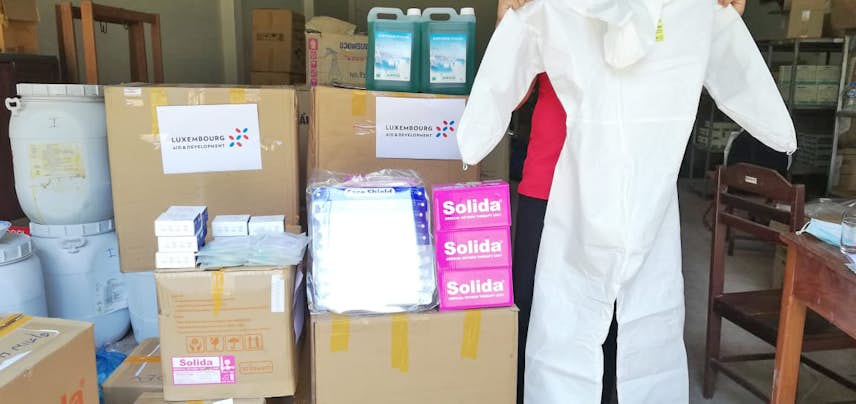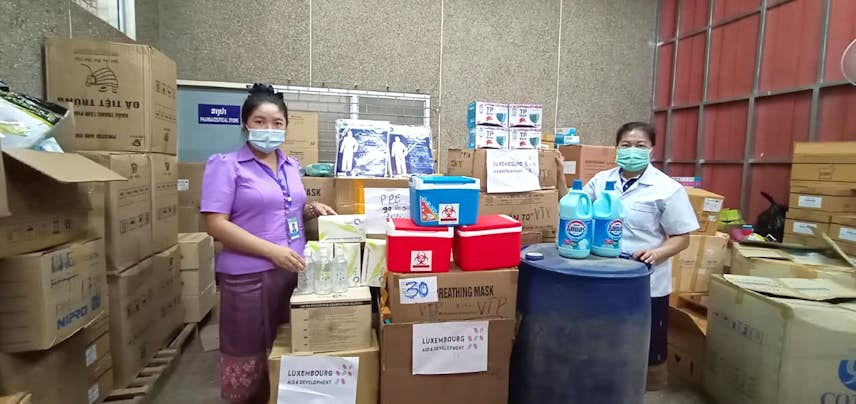COVID-19
The countries of the South, whose public health systems are often already fragile, are particularly badly impacted by the effects of the health crisis linked to COVID-19, with vulnerable groups on the front line suffering disproportionately. In this context, starting in the first quarter of 2020 Luxembourg’s Development Cooperation provided a coordinated response, both in terms of development cooperation and on humanitarian action. It sought on the one hand to directly support its partner countries bilaterally, and on the other hand to help with the international community’s response.
In order to maximise the consistency and impact of its support, Luxembourg’s Development Cooperation worked in a fully integrated manner within the Team Europe approach of the European Union and its Member States. This is the favoured European framework for the external response to COVID-19, both for meeting short-term and vitally important needs and also for structural socio-economic support forming part of medium and long-term assistance. At the end of 2020, Luxembourg’s contributions thus amounted to nearly EUR 69 million, with priority allocation of resources to West Africa, home to five of Luxembourg Development Cooperation’s seven priority partner countries.
At the bilateral level, Luxembourg’s Development Cooperation provided, among other things, direct aid of nearly EUR 14 million for the health emergency in Cabo Verde, Burkina Faso, Mali, Niger, Senegal, Laos, Mongolia, Myanmar, Nicaragua, El Salvador and Kosovo. This support, some of which will be continued beyond 2020, was implemented through LuxDev, Luxembourg’s development cooperation agency. In some partner countries where Luxembourg’s Development Cooperation implements multiannual health programmes, such as Laos and Senegal, efforts have in addition been initiated with the national partners to boost or incorporate specific support elements. The latter relate, specifically, to consolidating health systems and pandemic prevention and treatment mechanisms, including through the provision of technical assistance and of key equipment, including cold chain facilities.
In addition to this support, there is targeted and thematic financial support for development and humanitarian action to multilateral actors and instruments, non-governmental organisations and to operations run by the International Committee of the Red Cross (ICRC). In line with its multilateral commitments, Luxembourg thus strengthened its support to certain of its major partners, including the Vaccine Alliance (Gavi), the Global Fund to Fight AIDS, Tuberculosis and Malaria, the World Health Organization (WHO) and the United Nations Office for the Coordination of Humanitarian Affairs (UNOCHA). To contribute to fair distribution of COVID-19 vaccines, particularly in the countries of the global South, Luxembourg also decided to make a commitment with a budget of EUR 1 million to the COVAX international sharing mechanism, under the aegis of Gavi, the Vaccine Alliance. Recognising the importance of the contributions and partnerships of Luxembourgish and international non-governmental organisations locally, Luxembourg’s Development Cooperation also provided additional financing and facilitated the reorientation of activities towards the response to COVID-19.
TEAM EUROPE
Team Europe is the single European framework for the external response to the COVID-19 crisis in order to tackle the immediate health crisis and humanitarian needs in the partner countries. This concept was subsequently extended to address, in addition, the more long-term structural impact on the societies and economies of the countries in question, and covered the orientation of the EU’s multiannual programmes with its partner countries.
Since it was launched in April 2020, Team Europe has mobilised EUR 38.5 billion. In 2020, Luxembourg, which aligned itself with this common EU approach, contributed EUR 68.88 million to the COVID-19 response.
Team Europe’s political priorities are:
- emergency aid and humanitarian aid;
- support for basic health, water and sanitation and nutrition systems;
- support for socio-economic recovery.
The values guiding the approach are European solidarity with the partner countries and the EU’s determination to show global leadership for a sustainable recovery. The themes of sustainability and innovation are apparent in the links with the Green Deal, the Sustainable Development Goals (SDGs) and the principle of Build Back Better and Greener.
It can be seen that there is considerable impetus from the European Commission and the external service to assert the role of the European Union on the world stage with regard to geopolitics, as the EU is the largest donor in Africa, given the growing influence of other players in some partner countries or certain gaps in multilateral forums. The European Commission is actively looking for synergies to promote this approach in multilateral forums.
In this context, it should be noted that the Team Europe Initiatives, which are a manifestation of the Team Europe approach in the EU’s multiannual cooperation programmes with its partner countries, will be at the heart of programming for future years and will also be coupled to the NDICI – the Neighbourhood, Development and International Cooperation Instrument – which is the new financial instrument for development and neighbourhood, due to become operational in the next multiannual financial framework.
In general, Luxembourg has aligned itself with this approach and welcomes, in particular, the new dynamic it creates for joint programming but also on the political level.

